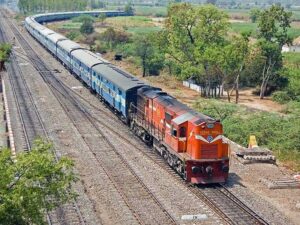Criticism and Praise: Pune Reacts to Union Budget 2024’s Impact on Infrastructure and Social Welfare

Reported by Varad Bhatkhande
Pune, 23rd July 2024: Everyone eagerly awaited the Modi Government 3.0’s first budget, which Finance Minister Nirmala Sitharaman presented today at 11 AM. According to Minister Sitharaman, the budget aims to provide relief to common citizens and improve conditions for people at all levels. The budget includes several significant announcements across various fields, although there are also some negative aspects, leading to mixed reactions from the public.
In her Union Budget 2024 presentation, Finance Minister Nirmala Sitharaman highlighted several strategic initiatives spanning agriculture, manufacturing, and the services sector. The budget introduced significant revisions to both the capital gains tax and income tax frameworks. “Our government has been entrusted with a unique chance to steer the country toward robust development and widespread prosperity. In the interim budget, we committed to laying out a comprehensive plan for realizing our vision of ‘Viksit Bharat’,” stated FM Nirmala Sitharaman.
She identified nine critical areas for governmental focus:
1. Enhancing productivity and resilience in agriculture
2. Employment creation and skill development
3. Promoting inclusive human resource development and social justice
4. Expanding manufacturing and services sectors
5. Advancing urban development
6. Ensuring energy security
7. Improving infrastructure
8. Fostering innovation and research
9. Implementing next-generation reforms
The budget also addressed specific support for Bihar and Andhra Pradesh, including heightened infrastructure investments and targeted financial aid. These measures aim to boost human resource development and economic opportunities, transforming the eastern region—comprising Bihar, Jharkhand, West Bengal, Odisha, and Andhra Pradesh—into a catalyst for achieving the ‘Viksit Bharat’ vision. Notable provisions were also made for enhancing education and job creation.
“This budget outlines actionable steps for the current year to address these priorities and drive significant change. It also revisits earlier announcements to strengthen their implementation and accelerate our progress toward the goal of Viksit Bharat,” Sitharaman remarked.
Additionally, a thorough review of the Income Tax Act was announced to enhance its clarity and user-friendliness. Changes include updates to the new tax regime slabs and an increase in the standard tax deduction from Rs 50,000 to Rs 75,000.
Aam Aadmi Party (AAP) spokesperson Mukund Kirdat said, “States where opposition parties are in power, such as Delhi and Punjab, are being ignored. In contrast, Bihar and Andhra Pradesh have received ‘special’ treatment. Even though Mahayuti is in power in Maharashtra, it has been neglected. Both today’s and previous budgets reveal a confused approach to the country’s current state and future direction. The budget should consistently address basic amenities and welfare works. However, this time, there are no new provisions for education, health, or social justice. With college education becoming increasingly expensive and out of reach for the middle class, 50 % of the country’s population earns less than one lakh, leaving ‘educational loans’ as the only option. Claiming that offering internships to one crore students will boost employment is misleading. Expectations regarding agricultural produce guarantees, the junior pension scheme, and fire protection schemes have not been met.”
Abhay Bhor, president of the Forum of Small Scale Industries, said, “The budget by the Indian Government has scammed our Maharashtra. Other states have been given much, but Maharashtra, which contributes the most GDP to our country, has been ignored. The government is just backing states that voted for them in the last Lok Sabha elections. It seems they are trying to make businesses from Maharashtra move to other states. The majority of MIDCs in Maharashtra lack basic facilities, which is why businesses in Maharashtra will relocate. Common citizens, especially those who are poor, are never given loans to help them become efficient.”
Prof Dr Alaknanda Matade appreciated the budget, saying, “This budget has increased the prices of non-biodegradable plastics and made solar energy components cheaper, which suggests that the government cares about the environment. Additionally, significant focus has been given to creating jobs for youth, with Rs 2 lakh crore planned for job generation. The government has done a good and commendable job. While there are some negatives, no budget is perfect, and it is impossible to satisfy everyone.”
Kiran Divekar, an owner of a small business in Pimpri Chinchwad, said, “Any budget doesn’t do anything for common people except increase tension. Today, everything has become expensive. Some people don’t even get to eat twice a day. People like us who earn daily are hurt by the government’s policies. The government should take care of us. They promise to give loans every year, but we common people never get them. If they give us loans and support us, we will become self-sufficient, but this never happens. I have stopped caring about national budgets.”
Padmanabh Shetty, president of the Pimpri-Chinchwad Hotel and Restaurant Association, said, “This year’s budget is a relief for the middle class, women, and youth. Overall, it is an expected and positive budget. Importantly, the changes that will be made are beneficial.”
Prashant Raul, an environmentalist, said, “No priority has been given to the environment in the budget. Efforts to reduce carbon emissions are very important. However, this budget shows that environmental protection is not a priority for the government.”
Dilip Batwal, Secretary of the Federation of Chakan Industries, said, “This budget is comprehensive and is designed to effectively move India toward becoming the third-largest economy in the world. The government has made a sincere effort to address the needs of every group in this budget, considering all segments of society. Development across sectors such as labour, women, the middle class, MSMEs, and agriculture has been incorporated. It is expected that this budget will fulfil the aspirations of all sections of society in India. However, in western Maharashtra, especially in Pune and Mumbai, there was no allocation for infrastructure development. These cities contribute significantly to revenue. Pune’s poor roads and inadequate infrastructure, including the lack of an airport, lead to daily traffic jams, which have a cumulative adverse effect on industry and production. This budget was anticipated to address these issues, but there are no specific provisions for infrastructure development in the region. It is hoped that the government will address this in the future. Otherwise, it will be like watering fruiting trees elsewhere, wasting efforts and negatively impacting tax generation and employment.”








